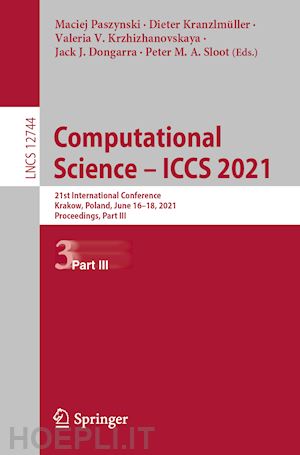
Questo prodotto usufruisce delle SPEDIZIONI GRATIS
selezionando l'opzione Corriere Veloce in fase di ordine.
Pagabile anche con Carta della cultura giovani e del merito, 18App Bonus Cultura e Carta del Docente
The total of 260 full papers and 57 short papers presented in this book set were carefully reviewed and selected from 635 submissions. 48 full and 14 short papers were accepted to the main track from 156 submissions; 212 full and 43 short papers were accepted to the workshops/ thematic tracks from 479 submissions. The papers were organized in topical sections named:
Part I: ICCS Main Track
Part II: Advances in High-Performance Computational Earth Sciences: Applications and Frameworks; Applications of Computational Methods in Artificial Intelligence and Machine Learning; Artificial Intelligence and High-Performance Computing for Advanced Simulations; Biomedical and Bioinformatics Challenges for Computer Science
Part III: Classifier Learning from Difficult Data; Computational Analysis of Complex Social Systems; Computational Collective Intelligence; Computational Health
Part IV: Computational Methods for Emerging Problems in (dis-)Information Analysis; Computational Methods in Smart Agriculture; Computational Optimization, Modelling and Simulation; Computational Science in IoT and Smart Systems
Part V: Computer Graphics, Image Processing and Artificial Intelligence; Data-Driven Computational Sciences; Machine Learning and Data Assimilation for Dynamical Systems; MeshFree Methods and Radial Basis Functions in Computational Sciences; Multiscale Modelling and Simulation
Part VI: Quantum Computing Workshop; Simulations of Flow and Transport: Modeling, Algorithms and Computation; Smart Systems: Bringing Together Computer Vision, Sensor Networks and Machine Learning; Software Engineering for Computational Science; Solving Problems with Uncertainty; Teaching Computational Science; Uncertainty Quantification for Computational Models
*The conference was held virtually.











Il sito utilizza cookie ed altri strumenti di tracciamento che raccolgono informazioni dal dispositivo dell’utente. Oltre ai cookie tecnici ed analitici aggregati, strettamente necessari per il funzionamento di questo sito web, previo consenso dell’utente possono essere installati cookie di profilazione e marketing e cookie dei social media. Cliccando su “Accetto tutti i cookie” saranno attivate tutte le categorie di cookie. Per accettare solo deterninate categorie di cookie, cliccare invece su “Impostazioni cookie”. Chiudendo il banner o continuando a navigare saranno installati solo cookie tecnici. Per maggiori dettagli, consultare la Cookie Policy.